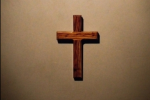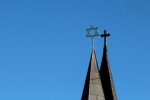November 19, 2013
That Old Time Religion: Looking Beyond Heyday History, Part 2
 My current parish is just over 100 years old, typical of Episcopal parishes near the heart of Los Angeles. It was founded in another Heyday, at a time when our city was being built, and when a whole lot of intrepid (mostly women) missionaries were on the loose, for better or for worse.
My current parish is just over 100 years old, typical of Episcopal parishes near the heart of Los Angeles. It was founded in another Heyday, at a time when our city was being built, and when a whole lot of intrepid (mostly women) missionaries were on the loose, for better or for worse.
St. Mary’s is a place that knows its history. There are numerous members who have family roots going back to the pre-World War II period at least. So when the parish set out think about the future, it was able to dig past the Big Heyday, and into some deeper stuff.
Our parish started because someone was paying attention. They noticed who was in the neighborhood, where people came from, what language they spoke. They noticed who was left out of the vision of many of the other churches in the area. They paid special attention to the kids.
They had a lot of assumptions about Americanization and Christianization that might not stand up to postmodern or postcolonial criticism. But they got close enough to the community they served to come up with ways of connecting that meant something. They became a heart for that community, a safe place, a place where people's value and beauty was affirmed. The white woman missionary at the center of the project even found ways to lift up local leadership, to step back from the center because she got that it was God's project and not hers, and that communities need spiritual leaders that reflect their own faces and language and experience.
No part of our history is perfect. Churches are made of humans, and always reflect at least some of the sins of our time. But the beginnings of our history take us back to a time before our existence was a given, to needs yet unmet, to the utter uncertainty of starting something out of nothing. Going all the way back discounts the worst (but sometimes most internally compelling) reason for our continued existence -- that old Episcopal favorite: "We've always done it this way."
Our congregations haven't always been here. At some particular moment, there was a reason we came into existence. Sorting through the need, the grace, the faith and the mistakes of our beginnings may do far more to direct and inspire our future than lamentation for Heydays past.
Where did your congregation come from? Why was it started? Has it nearly died and risen again? What can you draw from those beginnings as you look toward the future?





